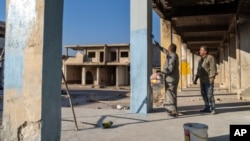The U.N. Development Program said in a new report Thursday that it will take at least a decade for Syria to return to prewar economic levels, and if current slow growth trends continue, it could take more than 50 years.
"I must say that the most startling figure at the moment is that should Syria continue to grow at the average of the past five years of growth — which was 1.3% GDP growth annually — it will go back to the 2010 GDP in 55 years," said Abdallah Al Dardari, UNDP assistant administrator and director of the Regional Bureau for Arab States, which produced the report, The impact of the conflict in Syria.
Al Dardari, who spoke to reporters remotely from Nairobi, said the massive amount of human loss — more than 600,000 Syrians have died in the war and another 113,000 have been forcibly disappeared with unknown fates — and material damage, compounded by a near total devaluation of the national currency, depleted foreign reserves, widespread unemployment, and 90% of the population having fallen into poverty, make recovery a Herculean task.
According to the report, in the year preceding the war's eruption, Syria's GDP was $62 billion, and it had a growth rate exceeding 5% over the previous five years. Currently its GDP is less than half that at $29 billion.
"The total estimated lost GDP over the period from 2011 to 2024 stands at approximately U.S. $800 billion [at 2010 prices]," the report states of the economic cost of the war.
Al Dardari said Syria has also suffered in terms of human development, having been set back 40 years on life expectancy, education levels and per capita income.
He said the report offers several scenarios for recovery and growth, but all require massive amounts of investment for success.
"Which, in turn, requires tremendous improvement in public administration, governance, transparency, accountability, institutional capacities and so on," he said, adding that the status quo is untenable.
Al Dardari said international sanctions can also have a "chilling effect" on Syria's ability to attract the billions in investment it needs to rebuild its infrastructure and economy.
"We need to consider sanctions seriously as reforms move on," he said. "We need to make sure that sanctions are dealt with in a way that allows Syria to take care of all these reforms and requirements."
Syria's interim authorities, which have been in power since they ousted the regime of Bashar al-Assad in mid-December, will receive the UNDP report on Friday. Al Dardari said the U.N. is ready to provide the necessary technical assistance for the implementation of the economic recovery scenarios in the report.




